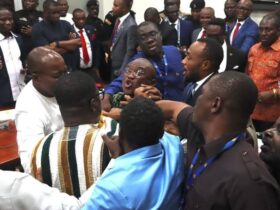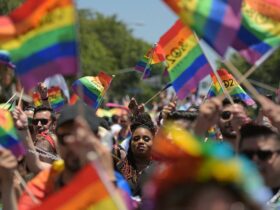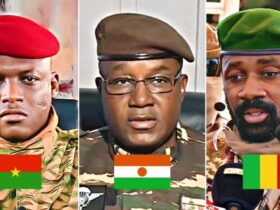
The Group Chief Executive Officer of Ethiopian Airlines, Mesfin Tasew, has revealed the controversies surrounding the launch of the Nigerian plane on May 26.
Tasew said Nigeria borrowed an Ethiopian plane and painted it as Nigeria’s claiming it’s for “inspection”.
Recall that on May 27, 2023, Senator Hadi Sirika, the Minister of Aviation in the cabinet of former President Muhammadu Buhari, flew the aircraft as his administration lied and deceived Nigeria to have achieved.
Sirika posted via his X account on May 26th and said, “We are here. To Almighty God be all the glory. It has been a very long, tedious, daunting, and difficult path. We thank everyone for the support. This, by the will of God, will be for us and generations to come. Ya Allah, make it beneficial for our country and humanity.”
However, journalist David Hundeyin revealed that the plane wasn’t for Nigeria, as Sirika and other hands in aviation had claimed. David Hundeyin noted the plane was borrowed and painted with Nigerian color.
He said, “Fraudster, You made sure the video didn’t show the registration number, and you actually moved the camera away when it was about to come into shot. You’ve been caught. Thief”
He further posted that, “In context, this is not today’s important story, but I thought to flag it up too. Aviation minister Hadi Sirika is committing broad daylight fraud by displaying this rented and hurriedly repainted @flyethiopian Boeing 737-800 as an aircraft belonging to a phantom “Nigeria Air”.
In an attempt to absolve himself of the guilt of failing and persuade President Muhammadu Buhari that he was successful, Minister of Aviation Alhaji Hadi Sirika allegedly struck a last-minute agreement with Ethiopian Airlines to repaint two of its aircraft for a static display on Friday, May 26 in Nigeria.
It was found that an ET aircraft had been utilized for a demonstration flight, in violation of the rules governing the formation of new airlines, a few days after the unveiling.
Speaking to a group of Nigerian journalists in Addis Ababa, Tasew stated that the East African airline had never planned to open a branch in Nigeria but had instead been invited by Buhari’s administration to launch Nigeria Air, the country’s official airline.
Taswe detailed how the federal government asked for the Nigeria Air emblem to be painted on an Ethiopian Airlines plane for inspection, which was agreed upon.
According to him, the airline initially rejected the invitation to start the airline but eventually accepted it because of the long-standing relationship it has with Nigeria, where it has four locations.
As Ethiopian Airlines and the Nigerian government were finalizing the shareholding arrangements, he said, they got a notification that certain Nigerian businesses and airlines were slandering Ethiopian Airlines and the national government. As a result, they filed a lawsuit and won an injunction to halt the formation of Nigeria Air.
Ethiopian Airlines wanted to back out as a result, but the Nigerian government demanded that it move forward with the process of establishing the national airline for the continent’s most populous country.
Ethiopian Airlines’ Group Chief Executive Officer stated that the company had not yet made a decision regarding whether to proceed with the establishment of Nigeria Air. However, the federal government insisted that the project would not be abandoned and that the groundwork should be completed until the court revokes the order.
Tasew stressed that Ethiopian Airlines was not solicited to become a partner of Nigeria Air; that airline had already been founded.
Tasew said, “At one point, the leadership of Nigeria Air, which doesn’t include Ethiopian Airlines, asked us to bring aircraft painted with the Nigerian logo to facilitate the progress of the Air Operators’ Certificate. So, we agreed with that. We took out one of our aircraft, painted it with the Nigerian logo, and flew it. It was for demonstration by the Nigerian Civil Aviation Authority (NCAA) for their inspection. So, after two days, we brought back the aircraft, repainted it with the Ethiopian logo, and it was flying. So, while we were here, waiting for the decision of the court, there was a change of government that took place.
“Ethiopian Airlines didn’t have any intention or plan to set up an airline in Nigeria. In May 2022, when I took on my current responsibility as Group CEO, a request came from the Nigerian government asking ET (Ethiopian Airlines) to participate in a bid and help the Nigerian government set up a Nigerian flag carrier. It came in writing.
“Initially, we didn’t want to go into that. We said we have other initiatives in other countries, and we were busy. But the Nigerian government insisted that Ethiopian Airlines is an African airline; it has to help the Nigerian government set up the national carrier. So, we had to respect them. We serve the Nigerian public and government by flying to four cities in Nigeria; we couldn’t say no; we cannot come and help you. So, we had to submit a proposal, and we had to respect the Nigerian government.
“And we thought that the Nigerian government had choices, ET being one, because they had also requested other airlines in the Middle East and Europe to participate in the bid. I don’t know whether they participated or not. We submitted our proposal, and we received a letter from the Ministry of Aviation saying that Ethiopian Airlines had been selected as a partner to set up the airline.
“Then the Nigerian government wanted the structure of investors to be Nigerian investing institutions, and the Nigerian government wanted only 5 percent shares to ensure that they have a presence in the airline and to facilitate the establishment of the airline. We had a lot of discussions, and we agreed, but we had some differences on some points.
“And while we were preparing the shareholder agreement, we heard that some companies in Nigeria, including airlines, started defaming and objecting to the establishment of the airline and defaming the name of the government and Ethiopian Airlines. At that time, we thought that if the Nigerian government didn’t want it and the Nigerian public didn’t want it, we could as well withdraw.
“But the Nigerian government insisted that no, that this is a strategic issue for Nigeria, and we have to continue. When this group of people went to court and brought a court order, we had to defend ourselves. We had to go to court together with the Nigerian government, including the Ministry of Transport.
“We had to defend ourselves. So, until now, it is not yet decided; as far as we know, it is under the court. But the Nigerian government insisted that we have to continue the background work until the court case gets a decision.
“Nigeria Air was established before us; it was already established by the Nigerian government before we were invited. It has its own leadership; it was doing a lot of things; it had started requesting the Air Operators’ Certificate (AOC) and making preparations. So, when we came in, it was a matter of restructuring the ownership of Nigeria Air. For your information, the logo was already defined by them; it was not by Ethiopian Airlines. And we thought that if Nigeria Air was established, the benefit would be for the Nigerian public and the Nigerian government.
“Because when we talked to the Nigerian government, why do you want to set up a new airline? They said they don’t have dependable airlines within Nigeria, and they wanted an airline that can provide dependable service that departs and arrives on time and that doesn’t cancel flights on the domestic market and also on the international market.
“The Nigerian government believes that airfares charged by foreign airlines are so high that the Nigerian public is at a disadvantage. So, the intention of the Nigerian government was to set up a very, very strong, reliable, and dependable national carrier that services both the domestic market and the international market. And we believe in it; that is why we wanted to move forward with it.”
“In the first place, it was not our initiative; it was the initiative of the government. Now, if the government wants us to cancel the project, it is fine with us. We have no problem. If the government wants us to continue with the project, the government has to solve the legal case in court. Otherwise, we are willing to support the Nigerian government in the establishment of the national carrier. So, we leave the decision to the Nigerian government.
“We have no issues; we will not be disappointed if it is cancelled. We are just there to help. And if the parties ask us to help, change their mind, or change their strategy, we are fine with that. This is what we told the Minister—that we respect whatever decision the Nigerian government makes.
“But in our opinion, what has been said in the media is completely wrong. If we go there, our goal is not to kill Nigerian airlines—absolutely not. We have no intention of killing Nigerian airlines. Definitely, we have to set up a reliable airline; we have to provide a service that fits the needs of the Nigerian public. In fact, they have to be strong.”
“If these airlines cannot be strong, they cannot compete. If they cannot compete, then some of them can go out of business. It is not peculiar to the air transport business; in any business where there is competition, the stronger ones will grow and the weaker ones will get dwarfed.
“So, a strong airline will force the other airlines to revisit their efficiency. To revisit their operation and provide more dependable service from which, at the end of the day, the Nigerian public will benefit. So, they said if Ethiopian Airlines comes, it will kill us. We have no intention of killing them but to provide good service. And some say no, they will come with all their old aircraft. No, that is wrong. We will come with good young airplanes.”








Leave a Reply